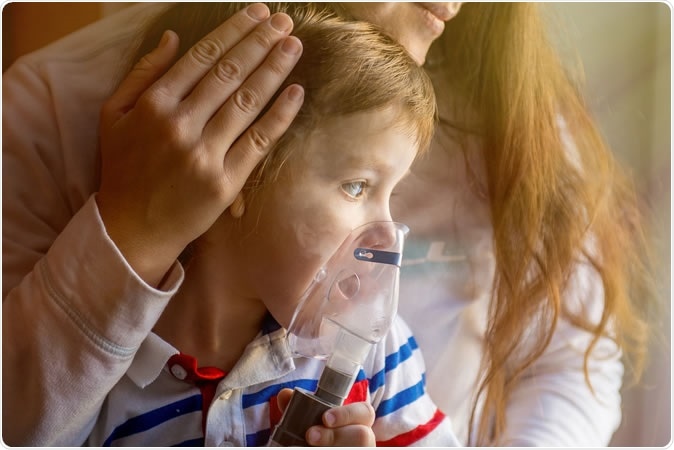According to a new study from researchers at Simon Fraser University's Faculty of Health Sciences (SFU), exposure to household cleaning products as babies could raise the risk of childhood asthma in children to the age of 3 years. The study titled, "Association of use of cleaning products with respiratory health in a Canadian birth cohort," was published in the latest issue of the journal CMAJ (Canadian Medical Association Journal).

The researchers aimed to examine associations between use of household cleaning products in early life and childhood respiratory and allergic disease using data from the Canadian Healthy Infant Longitudinal Development (CHILD) Cohort Study. Image Credit: Helen Sushitskaya / Shutterstock
A team of researchers looked at a large cohort of babies to arrive at their conclusions. The authors of the study wrote that long term studies are essential in understanding the association of various risk factors and the causation of childhood asthma. This study was based on data collected from the Canadian Healthy Infant Longitudinal Development (CHILD) Cohort Study, they wrote. The experts added that there had been a steady rise in cases of pediatric asthma over the past few decades, and this is "now a leading cause of childhood chronic disease and admissions to hospital in developed countries, making it a priority for clinicians, researchers and the public." They explained that most young children spend around 80 to 90 percent of their time indoors and are thus especially vulnerable to the chemicals used at home.
Professor Tim Takaro, lead researcher and clinician-scientist at SFU, said in a statement, "Most of the evidence linking asthma to the use of cleaning products comes from adults. Our study looked at infants, who typically spend 80%-90% of their time indoors and are especially vulnerable to chemical exposures through the lungs and skin due to their higher respiration rates and regular contact with household surfaces."
For this study, the team used parental questionnaires and looked at the frequency of use of 26 different house cleaning products in the houses of 2022 children who were enrolled in the CHILD cohort. The children belonged to four provinces - Vancouver, BC; Edmonton, Alberta; Winnipeg, Morden and Winkler, Manitoba; and Toronto, Ontario. The babies were enrolled in the study when they were around 3 to 4 months of age, and based on the answered questions, the team created a "Frequency of Use Score (FUS)." Next, they compared the rising frequency of use with childhood asthma symptoms such as repeated episodes of wheezing, diagnosis of asthma or atopy or skin allergic conditions that is closely associated with childhood asthma. The assessments were done at the age of 3 years for the children, and the data collection took place between 2208 and 2015.
Some of the commonly used cleaning products included dishwashing soap. Dishwasher detergents, surface cleaners, glass cleaners, and soaps used for laundry. Among the children involved in the study, 65 percent were white, and 76 percent had not been exposed to tobacco smoke up to the age of around 3 to 4 months. Further, 65 percent of the children included in the study did not have parents who suffered from asthma.
Results showed that children who lived in households with greater frequency of use of household cleaning products were more at risk of recurrent episodes of wheezing, recurrent wheeze along with atopy, and also a diagnosis of childhood asthma. Such usage of cleaning products was not associated directly with an increased diagnosis of atopy alone at three years, wrote the researchers. Girls were more at risk of this association compared to boys wrote the researchers, but the differences between the genders were not statistically significant. The breathing problems were more pronounced with the use of scented and spray formulation of the cleaning products, the team noted.
According to the team, the chemicals present in the cleaning products could be harmful to the linings of the respiratory tract of the infants, and this could be causing the immune systems of the babies to overreact and cause asthma and the wheeze. These chemicals, they speculated, could also be altering the gut microbiome or microbes in the infants and give rise to inflammation and features of asthma.
First author of the study, Jaclyn Parks, a graduate student in SFU's Faculty of Health Sciences, and coauthors wrote, "Our findings add to the understanding of how early life exposures to cleaning products may be associated with the development of allergic airway disease and help to identify household behaviours as a potential area for intervention."
Dr. Elissa Abrams, Department of Pediatrics, Section of Allergy and Clinical Immunology, University of Manitoba, Winnipeg, Manitoba, and the University of British Columbia, Vancouver, wrote a commentary on the study in the same issue of the journal. She wrote, "Studies that identify avoidable factors to inform asthma prevention efforts are of paramount importance. The linked study points to small preventive changes that could be considered, especially among families of children at risk of asthma."
Journal reference:
Association of use of cleaning products with respiratory health in a Canadian birth cohort Jaclyn Parks, Lawrence McCandless, Christoffer Dharma, Jeffrey Brook, Stuart E. Turvey, Piush Mandhane, Allan B. Becker, Anita L. Kozyrskyj, Meghan B. Azad, Theo J. Moraes, Diana L. Lefebvre, Malcolm R. Sears, Padmaja Subbarao, James Scott, Tim K. Takaro CMAJ Feb 2020, 192 (7) E154-E161; DOI: 10.1503/cmaj.190819, https://www.cmaj.ca/content/192/7/E154